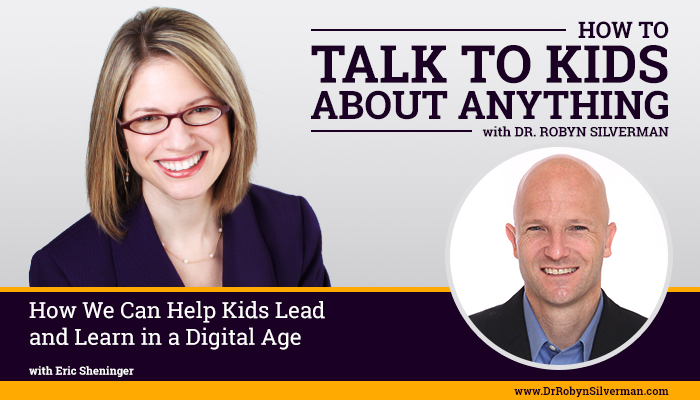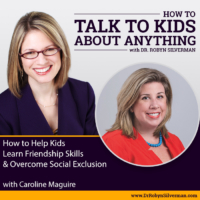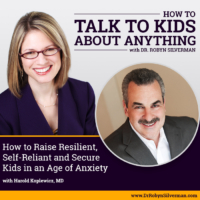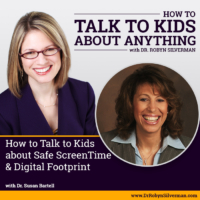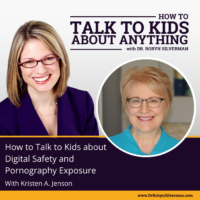Podcast: Play in new window | Download
Subscribe: Apple Podcasts | RSS | More
How we can help kids lead and learn in a digital age
This podcast provides the perspective of how to use technology to help children lead and learn in the digital age. How can we avoid the pitfalls while bravely embracing the vast technology that children are exposed to each day so that our young people can enjoy the benefits that technology can afford them? What actions can we take that corrects the lack of engagement many children feel in school by integrating technology that makes learning more fun and innovative? Our guest, Eric Sheninger, explains.
Special Guest: Eric Sheninger
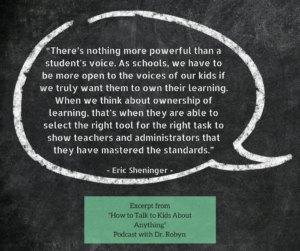 There’s no question that things have changed dramatically in the world of kids since we were young. After all, the phones we had were connected to the wall and had long coiled cords that we stretched as far as they could go so we could get some privacy in a bathroom or a closet. The only webs we spoke of were spider webs, a tablet was something you took when you were sick and movies could only be seen in theaters or on HBO, as long as you were willing to get out of your seat and physically go change the channel. I know, the horror.
There’s no question that things have changed dramatically in the world of kids since we were young. After all, the phones we had were connected to the wall and had long coiled cords that we stretched as far as they could go so we could get some privacy in a bathroom or a closet. The only webs we spoke of were spider webs, a tablet was something you took when you were sick and movies could only be seen in theaters or on HBO, as long as you were willing to get out of your seat and physically go change the channel. I know, the horror.
Today’s push button culture is certainly not all bad—it’s just different. And like it or not, this is the world of our kids. As I’ve said, there are not 2 kinds of life- “real life” and “cyber life” it’s all just life as our kids know it.
As we all want our kids and our students to thrive at home and in school, what do we need to know about this digital age and how can we help our kids to become leaders and learners given the new technology?
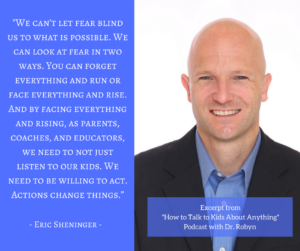 That is the topic we are focusing on today with our guest Eric Sheninger.
That is the topic we are focusing on today with our guest Eric Sheninger.
Eric is a Senior Fellow and Thought Leader on Digital Leadership with the International Center for Leadership in Education (ICLE), Prior to this he was the award-winning Principal at New Milford High School. Under his leadership his school became a globally recognized model for innovated practices. His work focuses on leading and learning in the digital age as a model for moving schools and districts forward. This has led to the formation of the Pillars of Digital Leadership, a framework for all educators to initiate sustainable change to transform school cultures. As a result, Eric has emerged a an innovative leader, best selling author, and sought-after speaker.
His latest books, *Learning Transformed: 8 Keys to Designing Tomorrow’s Schools (June) and *BrandEd: Tell your story, build relationships and empower learning, Uncommon Learning: Creating Schools that work for kids and Digital Leadership: Changing Paradigms for Changing Times all beg the adults in the lives of children to allow children to use today’s technology to show their creativity, their innovation and their strengths and leave behind tired or antiquated educational techniques that are not conducive to the world of today’s youth. You can find out more about Eric at EricSheninger.com.
This podcast provides:
- Perspective- using technology to open up the world for students.
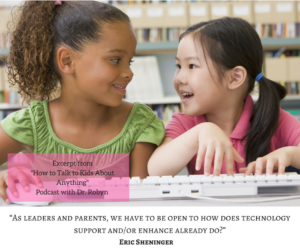
- Perspective on the pitfalls of technology
- How parents to help kids to speak to their schools about technology and how it can support learning.
- Tips on how we can support our children in using technology to learn and grow.
- How schools can use technology to expand the learning opportunities for children.
Important Messages:
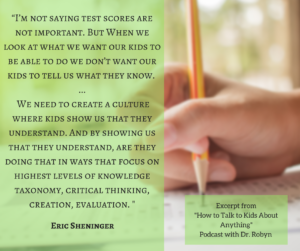
- Tech doesn’t need to be used all the time- but it should be used with a purpose. How does it help us do what we do better?
- Technology can help us learn- it helps us to work smarter rather than working harder.
- We don’t want to use technology as a digital pacifier. We need to be honest with ourselves.
- We need to cover too much screen time, digital safety and other pitfalls. And we have to ensure that we aren’t being hypocrites- what are we teaching kids about digital use/abuse?
- Kids don’t know how to use technology about high-level learning.
- Kids need guidelines and conversations about expectations around technology.
- Many districts purchase technology but don’t give training and guidelines to teachers and students to help them use the technology to thrive and open up education.
- Scripts: How to talk to teachers and parents about technology when they are used to traditional education.
- We need to ask our kids- what do you think about your school & your learning? What will help you to feel more involved?
- We need to teach kids how to speak multiple languages, how to dissect code and write code and ultimately, how to think.
- We need to teach kids to speak up and how to create a rational argument of how technology can help support their learning.
- Parents need to become more educated about how tech can support learning.
- Gallup showed the more kids are in school, the less engaged they are.
- We often go back to our level of comfort- but what worked for us might not work very well for our kids.
- Parents and educators are worried- but we can’t let fear govern how we move forward.
Notable Quotables:
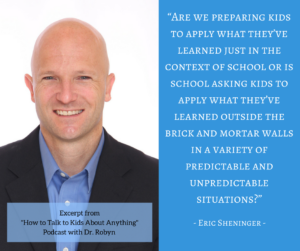
- “We have to be open on not just focusing on new digital skills but digital competencies. Why are they so important? Because as we think about the collaboration, communication, digital identity, citizenship, creativity, the key is, do our kids have not just the skills or knowledge but the behaviors, the attitudes, the attributes to be prepared to succeed in a world that, quote honestly, we have no idea what it’s going to look like?”
- “As leaders and parents, we have to be open to how does technology support and/or enhance already do?”
- “Technology should be a ubiquitous component of what we do. It’s not about using it all the time, it’s about using it with purpose.” *
- “Are we preparing kids to apply what they’ve learned just in the context of school or is school asking kids to apply what they’ve learned outside the brick and mortar walls in a variety of predictable and unpredictable situations?”
- “We want and expect our kids to be taught in the same way we were. But here’s the problem. We grew up in the world where we know what it was like when there was no internet. Yes, it might have worked for us. But we are just preparing kids to be compliant and follow rules to do school, I can tell you this with utmost certainly, our kids will not be prepared because the jobs our schools are preparing our kids for no longer exist.”
- “I’m not saying test scores are not important. But here’s the problem. As parents and community members, that’s all we look at a determining factor as to whether or not a school is successful. When we look at what we want our kids to be able to do we don’t want our kids to tell us what they know. They can Google the answers to questions that we are still asking in schools. We need to create a culture where kids show us that they understand. And by showing us that they understand, are they doing that in ways that focus on highest levels of knowledge taxonomy, critical thinking, creation, evaluation. Are they applying what they know across multiple disciplines? Are they applying what they know to solve real world predictable problems? Are they using their extensive knowledge, mindsets, skills to solve real-world unpredictable problems?
- “We need to focus more on the messiness of learning instead of chasing a letter grade and getting on honor roll.”
- “There’s nothing more powerful than student voice. As schools, we have to be more open to the voices of our kids if we truly want them to own their learning. When we think about ownership of learning, that’s when they are able to select the right tool for the right task to show teachers and administrators that they have mastered the standards.”
- “We need learn how to unlearn and relearn what we were taught because the world is different.”
- “Nobody likes change and right now we are in a time period of exponential change. Because we don’t understand, we hunker down in fixed mindset and go back to our level of comfort which is how we were raised and how we were taught. But what worked for us does not work very well for our kids.”
- We are worried about our future but our kids are our future. We can’t let fear blind us to what is possible. We can look at fear in two ways. You can forget everything and run or face everything and rise. And by facing everything and rising, as parents, coaches and educators, we need to not just listen to our kids. We need to be willing to act. Actions change things.”
Resources:
- www.EricSheninger.com
- www.twitter.com/EricSheninger
- International Center for Leadership in Education (ICLE) http://www.leadered.com/

